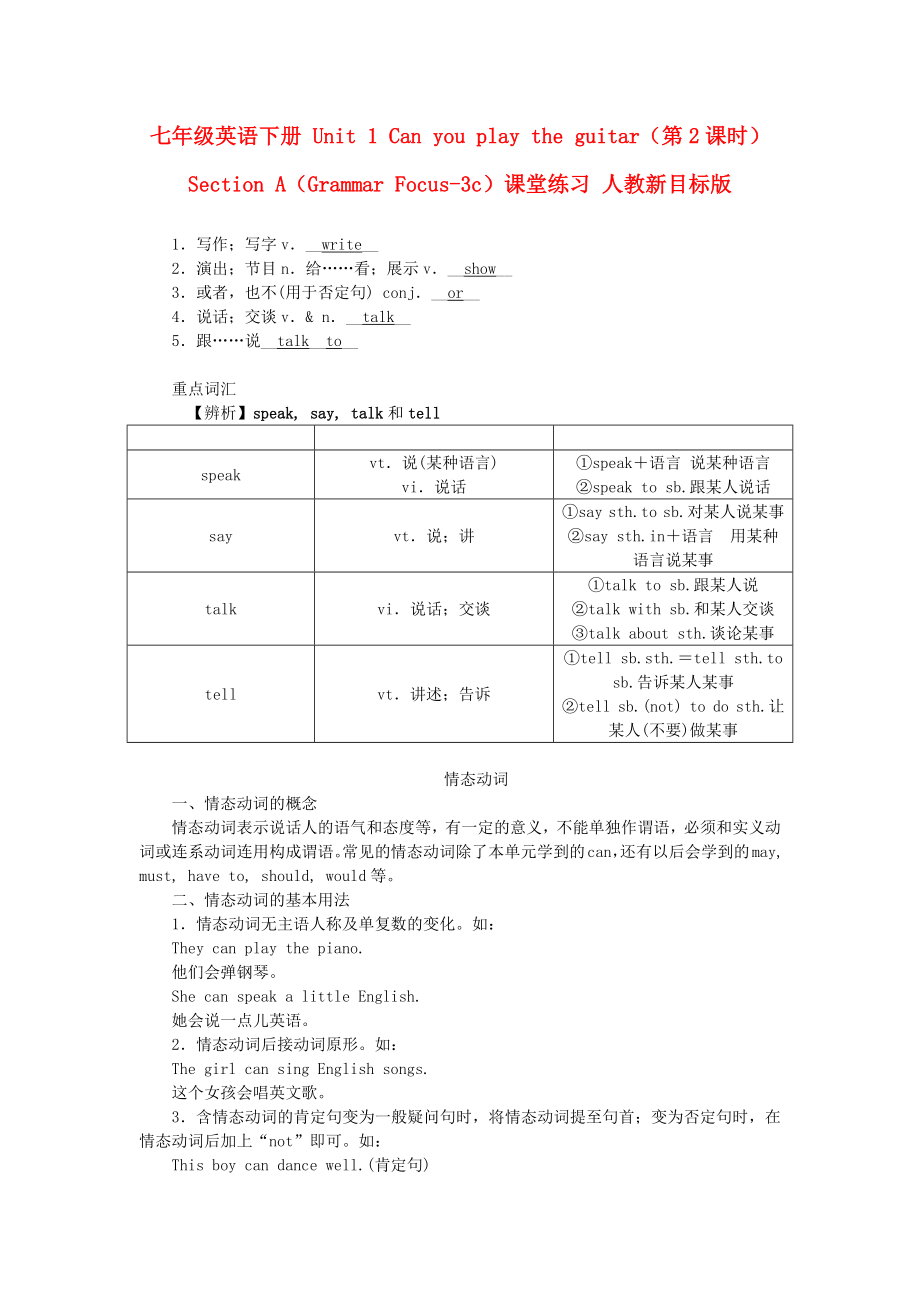《七年級(jí)英語下冊 Unit 1 Can you play the guitar(第2課時(shí))Section A(Grammar Focus-3c)課堂練習(xí) 人教新目標(biāo)版》由會(huì)員分享�����,可在線閱讀,更多相關(guān)《七年級(jí)英語下冊 Unit 1 Can you play the guitar(第2課時(shí))Section A(Grammar Focus-3c)課堂練習(xí) 人教新目標(biāo)版(3頁珍藏版)》請(qǐng)?jiān)谘b配圖網(wǎng)上搜索�����。
1�����、七年級(jí)英語下冊 Unit 1 Can you play the guitar(第2課時(shí))Section A(Grammar Focus-3c)課堂練習(xí) 人教新目標(biāo)版
1.寫作�����;寫字v.__write__
2.演出;節(jié)目n.給……看�����;展示v.__show__
3.或者�����,也不(用于否定句) conj.__or__
4.說話�����;交談v.& n.__talk__
5.跟……說__talk__to__
重點(diǎn)詞匯
【辨析】speak, say, talk和tell
speak
vt.說(某種語言)
vi.說話
①speak+語言 說某種語言
②speak to
2、sb.跟某人說話
say
vt.說�����;講
①say sth.to sb.對(duì)某人說某事
②say sth.in+語言 用某種語言說某事
talk
vi.說話�����;交談
①talk to sb.跟某人說
②talk with sb.和某人交談
③talk about sth.談?wù)撃呈?
tell
vt.講述�����;告訴
①tell sb.sth.=tell sth.to sb.告訴某人某事
②tell sb.(not) to do sth.讓某人(不要)做某事
情態(tài)動(dòng)詞
一�����、情態(tài)動(dòng)詞的概念
情態(tài)動(dòng)詞表示說話人的語氣和態(tài)度等�����,有一定的意義�����,不能單獨(dú)作謂語,必須和實(shí)義動(dòng)詞或連系動(dòng)
3�����、詞連用構(gòu)成謂語�����。常見的情態(tài)動(dòng)詞除了本單元學(xué)到的can�����,還有以后會(huì)學(xué)到的may, must, have to, should, would等�����。
二�����、情態(tài)動(dòng)詞的基本用法
1.情態(tài)動(dòng)詞無主語人稱及單復(fù)數(shù)的變化�����。如:
They can play the piano.
他們會(huì)彈鋼琴�����。
She can speak a little English.
她會(huì)說一點(diǎn)兒英語�����。
2.情態(tài)動(dòng)詞后接動(dòng)詞原形�����。如:
The girl can sing English songs.
這個(gè)女孩會(huì)唱英文歌�����。
3.含情態(tài)動(dòng)詞的肯定句變?yōu)橐话阋蓡柧鋾r(shí)�����,將情態(tài)動(dòng)詞提至句首�����;變?yōu)榉穸ň鋾r(shí)�����,在情態(tài)動(dòng)詞后加上“not”
4、即可�����。如:
This boy can dance well.(肯定句)
→ Can this boy dance well�����?(一般疑問句)
→ This boy can't dance well.(否定句)
三�����、情態(tài)動(dòng)詞can的用法
1.基本用法
(1)表示能力�����,通常指在體力或腦力方面的能力�����,意為“能�����;會(huì)”�����。如:
Jim can play tennis.
吉姆會(huì)打網(wǎng)球�����。
(2)表示請(qǐng)求或許可�����,意為“可以”�����,這時(shí)可以和may通用�����,但是比may更正式�����。如:
Can I use your pen?
我可以用你的鋼筆嗎�����?
(3)表示推測,意為“可能”�����,常用于否定句或疑問句�����。如:
5�����、
Tom can't be at home.
湯姆不可能在家里�����。
2.句型結(jié)構(gòu)
(1)肯定句:主語+can+動(dòng)詞原形+其他�����。如:
Mary can play the guitar.
瑪麗會(huì)彈吉他�����。
(2)否定句:主語+can't+動(dòng)詞原形+其他。其中can't是can not的縮略式�����。如:
He can't play the piano.
他不會(huì)彈鋼琴�����。
(3)一般疑問句:Can+主語+動(dòng)詞原形+其他�����?如:
—Can you play chess?
——你會(huì)下國際象棋嗎�����?
肯定答語:Yes�����,主語+can.否定答語:No, 主語+can't.如:
—Yes, I ca
6�����、n./No, I can't.
——是的�����,我會(huì)�����。/不�����,我不會(huì)�����。
【注意】答語中作主語的人稱代詞應(yīng)根據(jù)問句中的主語作相應(yīng)的變化�����。如:
—Can Jill and Bob swim?
—Yes, they can./No, they can't.
——吉爾和鮑勃會(huì)游泳嗎�����?
——是的�����,他們會(huì)。/不�����,他們不會(huì)�����。
Ⅰ.用括號(hào)內(nèi)所給單詞的適當(dāng)形式填空�����。
1.I can't __talk__(talk) with you now.I have too much homework to do.
2.—Can your uncle __write__(write) stories?
—Yes
7�����、, he can.
3.What can your sister __do__(do)?
4.Can you __show__(show) me the way to the Ramada Hotel?
5.Jim __can't__(can) dance, but he can sing well.
Ⅱ.按要求完成下列句子�����,每空一詞�����。
1.My brother can play soccer.(改為一般疑問句)
__Can__ __your__ brother __play__ soccer?
2.Alice can finish the work.(改為否定句)
Alice
8�����、 __can't__ __finish__ the work.
3.—Can you and Bill do kung fu�����?(作肯定回答)
—Yes, __we__ __can__.
4.—Can your sister spell the word�����?(作否定回答)
—No, __she__ __can't__.
5.Grace and Anna can play__tennis.(對(duì)畫線部分提問)
__What__ can Grace and Anna __do__�����?
Ⅲ.單項(xiàng)選擇�����。
(D)1.—Can you sing English songs?
—Yes, I __
9�����、______.But I ________ sing well.
A.can; can
B.can't; can't
C.can't; can
D.can; can't
(C)2.Linda is my friend.She can ________ the guitar.
A.plays B.playing
C.play D.to play
(C)3.—Can your sister play the violin?
—________.She thinks it's too difficult.
A.Yes, she can
B.Yes, she do
10�����、es
C.No, she can't
D.No, she doesn't
(A)4.—Excuse me.Can you tell me what time it is now?
—Sorry, I ________.My watch doesn't work.
A.can't B.a(chǎn)m not
C.don't D.a(chǎn)ren't
(D)5.—What can you do?
—________.
A.He can sing B.I like apples
C.I can't sing D.I can play chess
Ⅳ.語法填空。
閱讀下面的材料�����,
11�����、在空白處填入一個(gè)恰當(dāng)?shù)脑~�����,或填入括號(hào)內(nèi)所給單詞的正確形式�����。
Mike is my good friend.He is a __1__(music).He can play __2__ violin well.He lives in Washington.Where does he work? In Seattle! He __3__(work) there five __4__(day) a week.He __5__(go) home on Friday night.He has a happy weekend with his wife.Mike likes __6__(sport) v
12�����、ery much.He __7__ his wife often play basketball games together.They also watch music __8__(show) sometimes.__9__Sunday night, Mike goes back to Seattle.He __10__(think) his life is interesting.
1.__musician__ 2.__the__ 3.__works__
4.__days__ 5.__goes__ 6.__sports__
7.__and__ 8.__shows__ 9.__On__
10.__thinks_
 七年級(jí)英語下冊 Unit 1 Can you play the guitar(第2課時(shí))Section A(Grammar Focus-3c)課堂練習(xí) 人教新目標(biāo)版
七年級(jí)英語下冊 Unit 1 Can you play the guitar(第2課時(shí))Section A(Grammar Focus-3c)課堂練習(xí) 人教新目標(biāo)版

